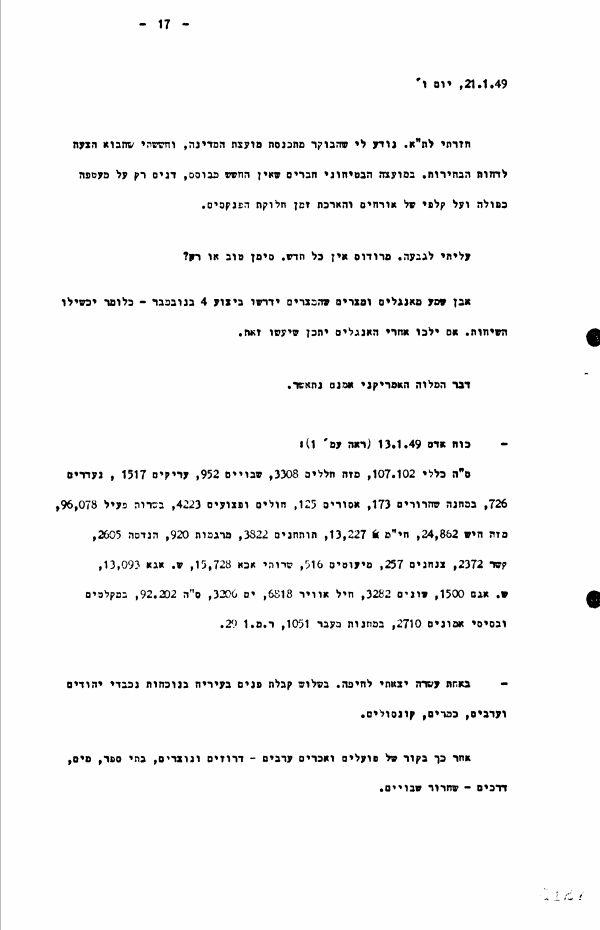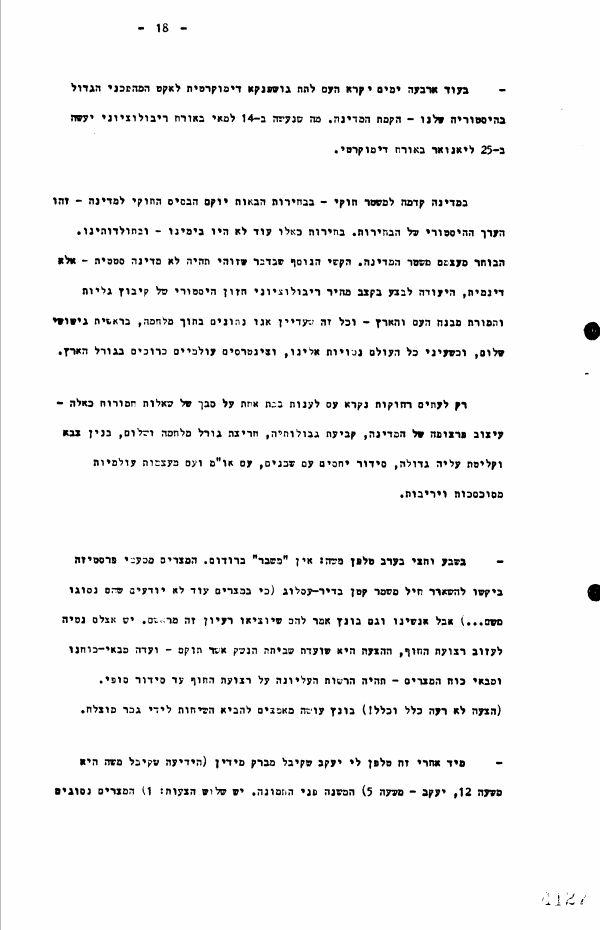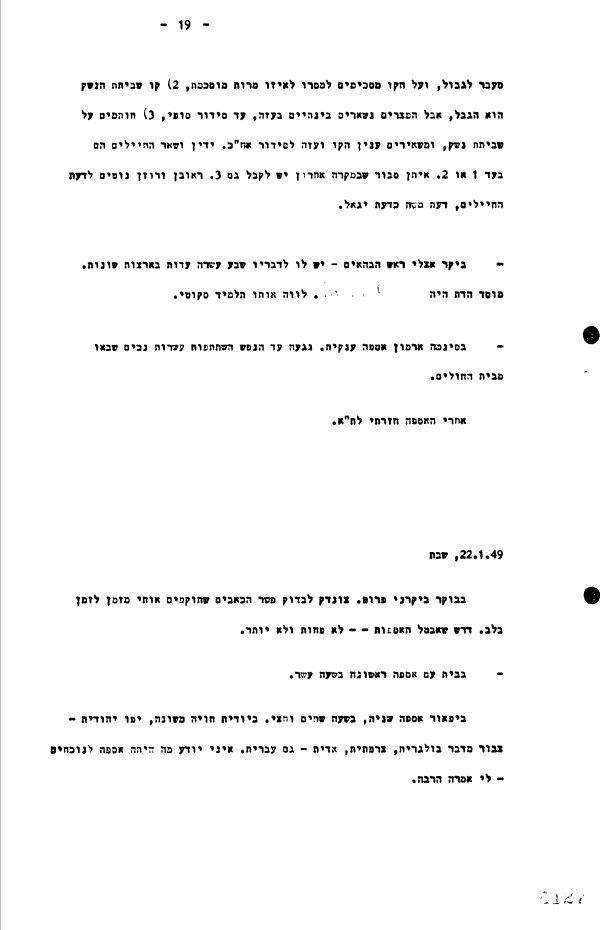1
of
Places:
Etan
Emunim
Egypt
Rhodes
Bir Asluj
H̠azon
H̠erut
Kedma
Nayn
Barak
Gaza
Haifa
People:
The use of the photograph is subject to the Copyright Law, 2007
21.01.1949
224848
Friday, January 21, 1939 I returned to Tel Aviv. I was informed that the State Council is convening this morning, and I was worried that a proposal to postpone the elections would be presented. At the Council, members promised me that there’s no basis for concern; they’re just discussing the double envelope and a voting booth for visitors and extending the deadline for the distribution of [ID] cards. I went up the hill [to the General Staff]. Nothing new from Rhodes. Good sign or bad one? [Abba] Eban heard from the English and the Egyptians that the Egyptians will demand implementation of [the] November 4 [Security Council resolution] – [otherwise] they’ll torpedo the talks. If they follow the English, they might do this. The American loan has indeed been approved. – Manpower as of January 13, 1949 (see page 1): Overall total 107,102, of whom [there are] 3,308 fallen, 952 POWs, 1,517 deserters, 726 missing, 173 in discharge camps, 125 prisoners, 4,223 ill and wounded, 96,078 in active service, of whom [there are] 24,862 Hayish [Field Corps], 13,227 garrison, 3,822 artillery corps, 920 mortars, 2,605 engineering, 2,372 signal, 257 paratroopers, 516 Minorities, 15,728 Personnel Department services, 13,093 Logistics Department s., 1,500 Operations Department s., 3,282 miscellaneous, 6,818 Air Force, 3,206 Navy, total 92,202, in take [facilities] and training bases 2,710, in transit camps 1,051, R.M. 1 [reshima mekubetzet? i.e., collective list, a military unit without a manpower standard (quota) that comprises soldiers temporarily not being counted in other units as part of those units’ standard] 29. – At 11 I left for Haifa. At 3 a reception in the municipality with Jewish and Arab dignitaries, [Christian] ministers, consuls. Then a visit by Arab workers and farmers – Druze and Christians; [they want] schools, water, roads, the release of POWs. – In four days the people will be called upon to give a democratic seal of approval to the greatest revolutionary act in our history – the founding of the state. What took place on May 14 in by way of revolution will take place on January 25 by way of democracy. The state preceded a legal regime, and the coming elections will provide the legal basis for a state – this is the historical significance of the elections. Such elections have never taken place in our time – in our history. The voter will shape the state’s government. The other difficulty is that this will not be a static state – but a dynamic one, destined to implement a historical vision of kibbutz galuyot [ingathering of the exiles] and transformation of the structure of the people in the country at a rapid, revolutionary rate, all while we’re still in the throes of war, just starting to send out feelers for peace, with all the world’s eyes upon us, and global interests intertwined in the fate of the country. Only rarely is a people called upon to address such a tangle of weighty questions all at once – shaping the face of the country, setting its borders, determining matters of war and peace, building an army and absorbing masses of immigrants, working out relations with neighbors, with the UN, and with disputing and adversarial global superpowers. – At 7:30 p.m. Moshe [Sharett] telephoned: There’s no “crisis” in Rhodes. The Egyptians, for reasons of prestige, asked to have a small garrison force remain in Bir-‘Isluj (because in Egypt they don’t yet know that they retreated from there…), but our men as well as Bunche told them to get this idea out of their heads. They are inclined to leave the coastal strip. The proposal is that the armistice commission that is to be established – a commission of our representatives and Egyptian representatives – will be the supreme authority over the coastal strip until there is a final arrangement (not at all a bad proposal!). Bunche is making an effort to bring the talks to a successful conclusion. – Immediately after that Ya’akov [Dori] telephoned me [to say] that he received a cable from [Yigael] Yadin (the message that Moshe received is from 12 o’clock, Ya’akov – from 5 o’clock) that changes the picture. There are three proposals: 1) The Egyptians withdraw across the border, and regarding the line [i.e., demarcation of borderline] they agree to turn it over to an agreed-upon authority. 2) The armistice line is the border, but the Egyptians remained in Gaza for now, until a final arrangement [is reached]. 3) An armistice [agreement] is signed, and the matter of a line [border] and Gaza are deferred to a future arrangement. Yadin and the other soldiers [military personnel on the delegation] favor 1 or 2. [Walter] Eytan thinks that as a last resort 3 should also be accepted. Reuven [Shiloah] and [Shabtai] Rosenne are inclined towards the soldiers’ view. Moshe’s view is the same as Yigael’s. – The head of the Bahais visited me – according to him he has seventeen communities in various countries. The religious institution was [“]inspired[”]. He was accompanied by a Scottish student. – A huge assembly at Cinema Armon [in Haifa]. Soulfully touching was the participation of dozens of disabled who came from hospitals. After the assembly I returned to Tel Aviv.











